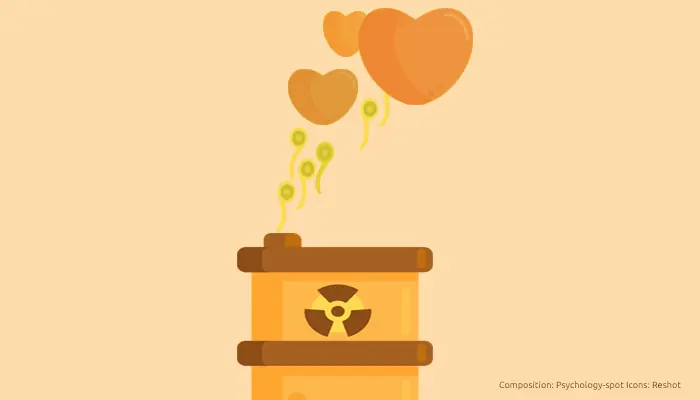
When it comes to relationships, most of us advance by trial and error. We have a preconceived image of what love should be like, formed by our expectations, cultural beliefs, and the perception of relationships we have seen growing up. However, sometimes these beliefs do not fit into the day-to-day life of a relationship, so they can become toxic habits that end up destroying it, without us realizing it.
The main toxic habits in a relationship that we should eradicate
1. Continuously take out each other’s dirty laundry
We are so accustomed to the mercantilist mentality that we practically apply it in our relationships. How? Every time we keep track of each other’s mistakes, failures or slip-ups and we bring them up at the worst of times: when we are angry.
However, holding a grudge is not the best way for a relationship to prosper. Airing out the dirty laundry will only make the other person defensive and the discussion will degenerate into a crossfire of reproaches. Blaming him/her for what happened a year ago will not solve today’s problem, it will only increase the tension.
If this relational pattern is maintained over time, both will allocate a large part of their energy to keeping track of the other’s failures, immersed in a kind of competition with the aim of proving that they are less guilty, instead of striving to resolve current conflicts.
What should we do?
Address each problem individually, unless some of them are unambiguously related. If your partner has betrayed your trust, for example, the option is to forgive him/her or break up. Moving forward holding a grudge will only feed a toxic pattern that will benefit neither of you. If something bothered you a lot a year ago, you should have fixed it a year ago. Bringing it up every time you get angry will only serve to increase the discomfort and distance between the two of you.
2. Turn the relationship into a hostage
Sending signals to our partner that the relationship is not on the right track is important if we want to straighten it out. However, using it as a weapon of emotional blackmail is toxic. There are people who, instead of focusing on the current problem or conflict, threaten the very existence of the relationship to activate the fear of loss, abandonment or loneliness.
For example, the person who holds your relationship hostage will not say “Sometimes I feel you distant” when his or her partner is indifferent, but will threaten him or her by saying “I can’t be with someone who always seems cold.” In this way, it adds unnecessary emotional drama that, over time, generates discomfort and sows doubts about the relationship.
Constantly threatening to break up the relationship will end up creating a toxic environment of mistrust and lack of commitment. How can we commit to someone who forces us to constantly walk a tightrope? As a result, it is likely that sooner rather than later we will feel psychologically suffocated and break up a relationship that generates more stress than well-being.
What should we do?
Of course, it is important that we express our feelings and say what we think, but without threatening the relationship and, above all, without using it as a weapon to make the other person feel guilty. In a relationship there are two people responsible. Therefore, we can get angry with our partner and tell him/her what we don’t like, but if we want the relationship to work, it is vital to do so with mutual responsibility and commitment. After all, love does not use threatening tones but rather conciliatory notes.
3. Using your partner as an emotional punching bag
We spend a lot of time with our partner, so it is not strange that he/she ends up becoming a kind of “punching bag” on which we vent all our frustrations. After a bad day at work or a bad streak, it is not unusual for friction to increase and arguments to escalate.
Blaming our partner because he/she has not been understanding after a bad day or because he/she is not sensitive enough to guess that we are not well, means holding him/her responsible for our emotions. However, our emotional state is our responsibility. Holding others responsible for our emotions is a subtle form of selfishness and is often also the expression of inadequate personal boundaries that opens the doors to emotional manipulation.
When we begin to unload our anger, disappointments, fears and resentments on the couple, we turn the relationship into a toxic space. We create a double psychological bind because the relational conflict will be added to our initial problem, which will only increase the discomfort. Furthermore, in the long run both of you will become bitter people who don’t want to be around each other.
What should we do?
A couple relationship must satisfy our emotional needs for support and understanding. Our partner must validate our emotions, but that does not mean that their life has to revolve around our emotional state at all times. There is a subtle but important difference between supporting a person and being obligated to do so at all times, even at the cost of our well-being. We must remember that any sacrifice must be an autonomous decision, not the result of an imposition. In a mature relationship, each person takes responsibility for their own emotions.
Obviously, this is much easier said than done, especially in contexts where there is high emotionality. However, it is worth asking ourselves if we are transferring our preconceived ideas and beliefs about what romantic love should be like to the relationship without asking our partner for his/her opinion. It is also worth asking ourselves if we are seeing our partner as an asset from whom we demand unconditional support and understanding and whom we blame for our discomfort, instead of seeing him/her as a life partner whom we must also support and understand.



